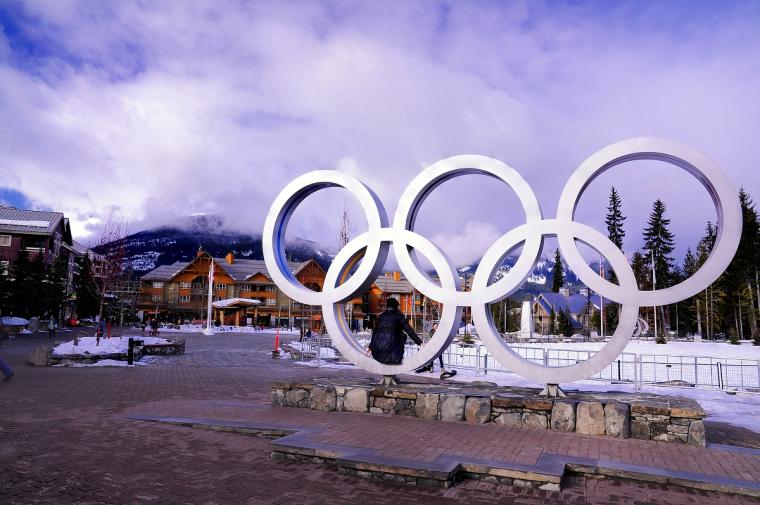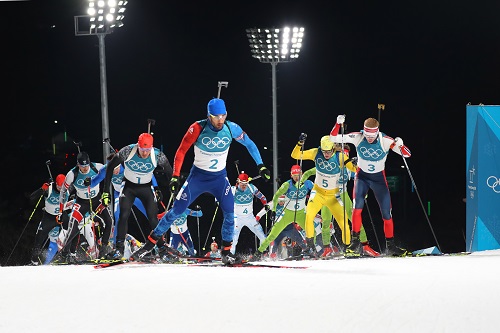
The International Olympic Committee has delayed announcing the host city of the 2030 Winter Olympics, citing … a lack of winter? No lie. Climate change is keeping the IOC from awarding the Games.
“Concern over warmer temperatures and vanishing snow in some of the world’s winter playgrounds has put the selection [on hold],” USAToday.com reports. “The International Olympic Committee said … it no longer plans to target host selection during its 2023 meeting. Instead, the committee will give its Future Host Commission for the Olympic Winter Games more time to address its challenges.”
“We have preliminary results on leading academic research on the impact of climate change, which shows a potential reduction in the number of climate-reliable hosts in the future,” Christophe Dubi, executive director of the Olympic Games, said at December’s IOC Executive Board meeting in Lausanne, Switzerland, where it also was suggested that the Winter Games might rotate “between a certain pool of cities and regions.”
Members also discussed the possibility of awarding both the 2030 and 2034 Winter Games at the same time, similar to the decision in 2017 “to award the 2024 and 2028 Summer Olympics to Paris and Los Angeles, to ‘create stability’ for winter sports and the Winter Games,” according to TheStadiumBusiness.com. Another report indicated that one proposal under consideration “would require future Winter Olympic hosts to prove their average minimum temperatures in February over 10 years were below freezing at potential snow competition venues.”
You may recall that organizers of the 2022 Winter Olympics relied on artificial snow in Beijing.
 As of late 2022, three cities were vying for the 2030 Winter Olympics, all of which previously had hosted the Games: Salt Lake City, Utah; Sapporo, Japan; and Vancouver, British Columbia, Canada. But Sapporo organizers recently paused their bid, and the British Columbia Government opted not to support a Vancouver bid. Salt Lake City organizers have indicated they would prefer to host the 2034 Games, in part to avoid clashing for sponsorships with the 2028 Los Angeles Summer Games.
As of late 2022, three cities were vying for the 2030 Winter Olympics, all of which previously had hosted the Games: Salt Lake City, Utah; Sapporo, Japan; and Vancouver, British Columbia, Canada. But Sapporo organizers recently paused their bid, and the British Columbia Government opted not to support a Vancouver bid. Salt Lake City organizers have indicated they would prefer to host the 2034 Games, in part to avoid clashing for sponsorships with the 2028 Los Angeles Summer Games.
Then there was this: InsideTheGames.biz reported Jan. 4 that “a joint bid between Valais in Switzerland and Chamonix in France and resorts in northern Italy could be launched to host the 2030 Winter Olympic and Paralympic Games. But Olympic officials in Switzerland are reluctant to back the campaign after the public voted in a referendum not to support a bid due to the excessive costs involved.”
This much is certain: The 2026 Winter Olympics will be held in Milan and Cortina d’Ampezzo, Italy.
Marshall Shepherd, an international expert on weather and climate at the University of Georgia, agrees with the IOC’s Dubi that the pool of host cities is shrinking as climate change evolves. “Some studies have shown that in the coming years only a handful of places will meet thresholds needed for Winter Olympic sports,” he told USAToday.com.
At its December meeting, IOC members referenced recent studies, including one in which researchers from United States, Canada and Austria examined weather conditions at all 21 cities that have hosted the Winter Olympics.
“The found the average February daytime temperatures had increased more than 10 degrees from Games held in the last half of the 1900s,” according to USAToday.com. “Without dramatic reductions in greenhouse gas emissions, the group concluded, only one of the 21 previous locations — Sapporo — would be able to provide reliably fair and safe conditions for snow sports by the end of the century.”
USAToday.com also noted that wacky weather is wreaking havoc on the International Ski and Snowboard Federation’s World Cup events in Austria and Italy:
• The women’s giant slalom season opener in Soelden, Austria, was canceled in October because of rain and wet snow.
• Two women’s downhill races planned for Nov. 5-6 in Zermatt-Cervinia, Italy, were canceled because of “unseasonable warm temperatures and heavy rainfall.”
• The snowboard opening competition in Livigno, Italy, was rescheduled to March in part because of a lack of snow.
• Parallel ski races during the Alpine skiing World Cup in Lech-Zurs were canceled in November. The federation said cold weather arrived too late. Lack of snow also forced the postponement of races there in November
Further complicating the IOC’s climate-related issues is a report from HostCity.com that recent World Cup host Qatar is one of 11 countries in formal talks with the [IOC] about the possibility of hosting a future Summer Olympics.
“Host City asked the IOC if it would consider allowing a Summer Olympic Games in the winter months to enable a bid from the Middle East,” according to the site. “‘This would be pure speculation at this point in time,’ the IOC Media Relations office said in an email.”
Expect social media to jump all over that - with no real reason. The IOC has stated, “As per an IOC Executive Board decision in 2003, and as clearly stated in the Future Host Questionnaire for the Olympic Games, the duration of the competitions of the Olympic Games shall not exceed sixteen days and the dates of the Olympic Summer Games shall be chosen within the period: 15 July to 31 August.”
In other words, what worked with FIFA for the World Cup just got a great big NO rubber-stamp from the IOC.

